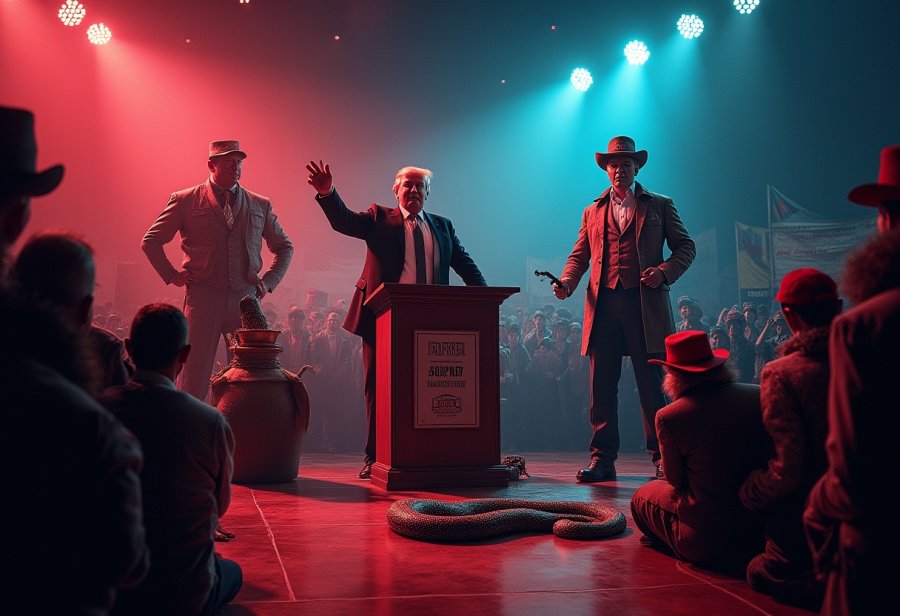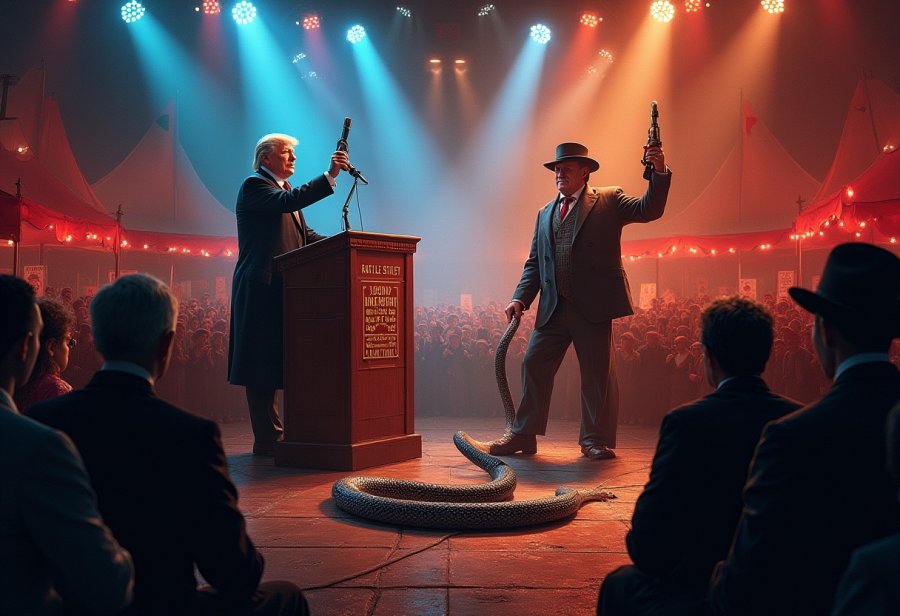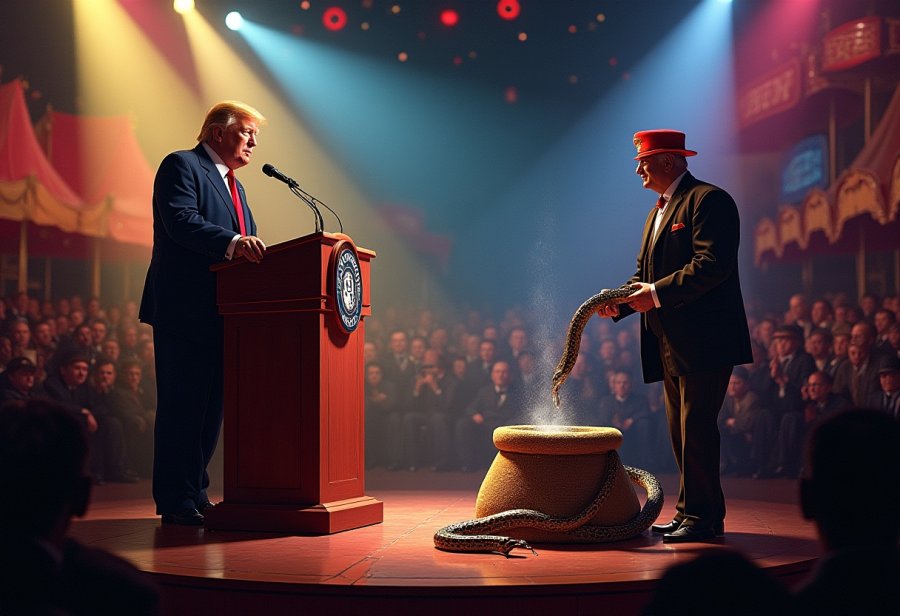Why are Americans irresistibly drawn to charismatic figures promising simple solutions—are we seeking genuine cures or falling prey to elegant illusions? This compelling exploration reveals that the allure of showmanship, from 19th-century medicine men to modern political rallies, taps into deep psychological needs for certainty and hope amid chaos. Charismatic leaders craft emotional stories, bold slogans, and spectacle-driven performances that forge powerful bonds, often blurring the line between genuine leadership and spectacle. The story of snake oil exemplifies how spectacle can distort truth, transforming authentic remedies into legends of deception. As political campaigns increasingly prioritize image over substance, democracy risks being reduced to a popularity contest, vulnerable to manipulation. Recognizing this pattern is crucial: are we craving authentic solutions or simply comfort in reassurance and illusion? Understanding this tension can help us navigate a landscape where spectacle often masks superficial fixes, urging us toward critical thinking and genuine engagement.

The Allure of Charismatic Leaders in American History: Spectacle, Emotion, and the Promise of Quick Fixes
Americans have long been captivated by charismatic leaders who promise simple, quick solutions to complex problems. This fascination isn’t a recent phenomenon; it’s deeply embedded in the cultural fabric. From the showmanship of 19th-century medicine men to today’s political rallies, the appeal extends beyond the messages themselves. It’s about the emotional experience, the hope these figures evoke, and the identity they help forge. People are naturally drawn to individuals who seem confident, authentic, and capable of cutting through chaos with clear answers—whether those answers are realistic or not.
Showmanship has always played a central role in shaping American history. In the 1800s, medicine shows combined entertainment with dubious cures, featuring daring acts and theatrical storytelling that mesmerized audiences. These spectacles created trust through drama and spectacle, transforming persuasion into an immersive experience. Similarly, political campaigns have relied on visual rallies, parades, and media stunts to foster emotional bonds and a sense of community. These events turn persuasion into entertainment, emphasizing emotional connection over detailed policy.
The human craving for simple solutions stems from how our brains process complexity. When faced with crises—be it economic downturns, social unrest, or health emergencies—we seek clarity because it offers relief from anxiety. Charismatic leaders understand this instinct well and craft messages that are easy to grasp and remember—often using catchy slogans or bold promises that feel intuitively right. This desire for certainty and quick fixes is reinforced by cultural stories that celebrate miracle cures and instant results, making audiences more receptive to ideas that sound too good to be true.
Emotional bonds leaders create deepen this attraction. Charismatic figures turn abstract problems into relatable stories, tapping into fears, hopes, and shared identities. When they project confidence and sincerity—even if superficial—they activate emotional responses that override skepticism. Their ability to forge personal connections makes their promises seem more genuine and urgent, encouraging followers to accept simple solutions in a confusing world.
Spectacle further reinforces this dynamic. From P.T. Barnum’s elaborate shows to modern political rallies, entertainment captures attention and stirs feelings more effectively than facts alone. Leaders turn campaigns into performances filled with slogans, symbols, and dramatic gestures that create memorable moments. These spectacles foster loyalty and community, making supporters more willing to overlook complexities and focus on the emotional experience—and the promise of quick fixes.
The story of snake oil exemplifies how genuine cures can be overshadowed by deception and spectacle. While real snake oil, made from Chinese water snakes, did have medicinal benefits, showmen like Clark Stanley turned it into a symbol of fraud through theatrical tricks. This illustrates how spectacle can distort reality, transforming authentic remedies into legends of deception. It reminds us that the desire for quick solutions often blurs the line between truth and myth, leaving us vulnerable to charlatans selling illusion as cure.
Populist leaders excel at creating identities that seem authentic while carefully managing emotional appeal. They tell personal stories, use simple language, and emphasize shared values—techniques that foster trust and loyalty. Even when calculated, these tactics give the impression of sincerity, convincing followers they’re supporting someone genuinely concerned. This illusion of authenticity amplifies influence, helping charismatic figures sell straightforward solutions to complex problems.
In the end, America’s enduring fascination with charismatic leaders and quick fixes reflects a deep-seated hope for relief and control. Whether in medicine shows or political rallies, the promise of a miracle cure taps into our collective desire for certainty amid chaos. Recognizing this pattern helps us understand why society gravitates toward spectacle and simple answers—sometimes more out of hope than naivety. The challenge is balancing openness to genuine solutions with healthy skepticism of the illusions charisma can create.
Why Human Nature Craves Simplicity: Psychological and Cultural Roots of Charismatic Appeal
Humans are naturally wired to seek simple answers, especially when faced with complex, overwhelming problems. Our brains crave clarity because it reduces uncertainty and gives us a sense of control. During times of economic upheaval, social unrest, or health crises, we instinctively look for quick, straightforward solutions that promise immediate relief. Charismatic leaders understand this deep-seated need and craft messages that are easy to grasp and remember—often using catchy slogans or bold promises that feel intuitively right. This craving for certainty isn’t just a casual preference; it’s embedded in our psychological makeup.
Culturally, American society has long celebrated the idea of miracle cures and rapid fixes. From the theatrical medicine shows of the 1800s to today’s viral social media campaigns, the narrative remains consistent: solutions should be fast, effortless, and deliver instant results. This shared belief reinforces the notion that even the most complicated issues can be solved with a single, magical remedy. Leaders and marketers exploit this mindset by framing their messages around rapid results, often skipping over nuance and complexity. The cultural obsession with instant gratification makes us more receptive to ideas that promise quick change—even if those promises are overly optimistic or unrealistic.
Our minds also seek stories and patterns that make sense of chaos. When faced with uncertainty, we cling to narratives that offer hope and simplicity. Charismatic figures excel at creating these stories—they transform intimidating, abstract problems into relatable tales that resonate emotionally. By exaggerating their expertise or ability to fix everything, they turn complex issues into manageable, urgent problems. Their confidence and storytelling tap directly into our desire to believe in immediate, certain fixes, often overriding skepticism and critical thinking.
Emotion plays a crucial role in this attraction. Leaders who project confidence and authenticity activate our emotional responses, making us more likely to trust their promises—even if those promises lack substance. When someone speaks with conviction, it creates a sense of trust and hope that can overshadow rational doubt. This emotional bond makes followers more willing to accept simple solutions, especially in a world that often feels unpredictable and overwhelming. The emotional resonance of a leader’s message turns their promises into perceived necessities rather than optional ideas.
Spectacle further amplifies this dynamic. From P.T. Barnum’s elaborate shows to modern political rallies, entertainment captures attention and stirs feelings more powerfully than facts alone. Leaders craft moments filled with slogans, symbols, and dramatic gestures that evoke strong emotions, fostering a sense of belonging and loyalty. These spectacles don’t just entertain—they persuade. They create memorable experiences that deepen emotional bonds, making supporters more receptive to straightforward promises wrapped in emotional and visual storytelling rather than detailed policy.
The myth of snake oil illustrates how genuine cures can be overshadowed by deception and showmanship. While real snake oil—made from Chinese water snakes—had medicinal benefits, showmen like Clark Stanley turned it into a symbol of fraud through theatrical tricks. This highlights how spectacle can distort reality, transforming authentic remedies into legends of deception. It reminds us that the desire for quick fixes often blurs the line between truth and myth, making us vulnerable to charlatans who sell illusion as cure.
In the end, our attraction to charismatic figures and simple solutions reflects a collective hope for relief and control. It’s a cultural pattern rooted in the need to feel empowered amid chaos. Whether through medicine shows or political rallies, the promise of a miracle cure taps into our deepest instincts: to find certainty in uncertainty. Recognizing these psychological and cultural patterns helps us understand why society gravitates toward spectacle and quick fixes—sometimes more out of hope than naivety. The challenge lies in balancing openness to genuine solutions with healthy skepticism of the illusions charisma can create.

Showmanship in Action: Case Studies of Persuasive Spectacle from Snake Oil to Modern Politics
Charismatic persuasion often hinges on creating moments that stir strong emotions and leave lasting impressions. Clark Stanley, known as the “Rattlesnake King,” exemplifies this with his theatrical medicine shows in the late 1800s. He captivated audiences by dramatically pulling live rattlesnakes from sacks and claiming their fat held miraculous healing powers. His daring acts and confident storytelling turned a simple sales pitch into a mesmerizing spectacle, forging a deep emotional bond with viewers. Despite the dubious nature of his cures, his showmanship made his promises seem convincing, demonstrating how entertainment can override skepticism and build trust.
Stanley’s performance wasn’t just about selling medicine; it was a carefully crafted act designed to evoke wonder and primal fears. His bold demonstrations played on primal fascination with danger, while his confident assertions created an illusion of scientific authority. This emotional engagement made people eager to buy his products, even when they knew deep down they might be buying into myth. His success highlights the power of spectacle in persuasion—transforming authenticity into illusion and making the extraordinary seem within reach through theatrical flair.
Fast forward to today, and the same principles are at play in political rallies, especially those of Donald Trump. His events are charged with energy—large crowds, memorable slogans, and theatrical gestures—that stir feelings of belonging and certainty. Like Stanley’s snake oil show, Trump’s rallies are performances designed to evoke strong emotional responses, turning politics into an immersive experience. These spectacles foster loyalty and community, making supporters more receptive to simple promises and emotionally charged narratives rather than complex policy details.
Both Stanley and Trump understand how spectacle manipulates perception. Stanley’s daring acts and Trump’s rally theatrics illustrate that persuasion relies less on facts and more on creating memorable emotional moments. When emotions are engaged through performance, supporters become more willing to accept even flimsy promises. This dynamic shows that effective persuasion often depends on the ability to craft experiences that resonate deeply—whether through daring stunts or powerful rhetoric—rather than through logical argument alone.
Recognizing these patterns reveals how spectacle and showmanship remain potent tools in shaping perceptions. Whether in medicine shows or modern politics, the art of captivating attention and stirring feelings is central to influence. While these tactics can inspire and motivate, they also pose risks—blurring the line between genuine leadership and entertainment. Being aware of this helps us see through illusions and question the substance behind the show, fostering a more critical perspective on persuasion in all its forms.
Understanding the enduring power of spectacle in persuasion encourages us to be more critical of the messages we encounter. To explore more about how showmanship influences public perception and decision-making, you can read about the art of persuasion in different contexts at psychology of spectacle.
The Democratic Dilemma: How Charisma and Spectacle Shape Society and Undermine Institutions
The fascination with charismatic figures doesn’t just shape individual opinions; it fundamentally influences how democracy functions. When voters prioritize personality and emotional appeal over policies and critical evaluation, the quality of public debate declines. Elections become less about substantive ideas and more about who can deliver the most compelling spectacle or emotionally resonant message. This shift risks turning democracy into a popularity contest where image and charisma overshadow competence and policy depth.
Leaders who thrive on spectacle often craft identities that seem authentic while carefully managing emotional bonds. They tell personal stories, emphasize shared values, and use simple language—techniques that foster trust and loyalty. However, these tactics can obscure the difference between genuine leadership and calculated showmanship. When followers accept oversimplified promises or divisive rhetoric because of their emotional attachment, critical thinking diminishes, and the marketplace of ideas shrinks, leaving voters more susceptible to manipulation and misinformation.
Spectacle-driven politics also weaken the checks and balances essential to democratic stability. Charismatic figures may bypass or undermine institutions such as legislatures and courts, appealing directly to their base. This personalized approach can erode accountability, fostering a style of governance rooted more in loyalty and emotional resonance than in adherence to democratic norms. Over time, this dynamic increases the risk of authoritarian tendencies, as leaders prioritize loyalty over institutional integrity.
The emphasis on emotional and visual cues in campaigns and media coverage shifts the focus away from policy nuance. Spectacle and soundbites dominate headlines and social media feeds, leaving little room for voters to understand complex issues. This environment fosters political illiteracy and makes the public more vulnerable to demagoguery and false narratives. As a result, polarization deepens, and the space for constructive, informed dialogue narrows, threatening the very foundation of informed democracy.
Counteracting these trends calls for a renewed focus on civic education, media literacy, and fostering critical thinking. Citizens need tools to recognize manipulation, question emotional appeals, and evaluate messages beyond surface-level spectacle. Strengthening institutional norms and promoting transparency can help ensure leaders are held accountable and that democracy remains rooted in substantive debate rather than entertainment. Recognizing the seductive power of spectacle is the first step toward safeguarding democratic integrity against the allure of illusion.

Navigating Illusions: Recognizing the Deep Roots of Our Attraction to Charismatic Solutions
People’s attraction to simple solutions runs deep, rooted in how our minds handle uncertainty and complexity. When faced with overwhelming problems—whether economic turmoil, social upheaval, or health crises—we instinctively seek clarity and certainty to regain a sense of control. Charismatic leaders understand this instinct perfectly and craft messages that are easy to grasp, often using catchy slogans or bold promises that feel intuitively right. Their skill lies in tapping into this psychological need, offering what seems like an immediate fix in a world that often feels unpredictable.
This desire for quick answers is reinforced by cultural stories of miracle cures and rapid transformations. From 19th-century medicine shows to today’s viral social media campaigns, the narrative remains consistent: solutions should be fast, effortless, and deliver instant results. This collective obsession with instant gratification makes us more receptive to ideas that promise quick change, even if those promises are overly optimistic or unlikely to hold up under scrutiny. We want relief now, often at the expense of understanding the deeper truths behind complex issues.
Our minds also seek stories that make sense of chaos. When uncertainty looms, we cling to narratives that offer hope and simplicity. Charismatic figures excel at creating these stories—they turn intimidating, abstract problems into relatable, digestible tales that resonate emotionally. By exaggerating their own expertise or ability to fix everything, they transform complex issues into manageable, urgent problems. This storytelling taps directly into our desire for immediate, certain solutions, often overriding critical thinking and skepticism.
Emotional connection plays a pivotal role. Leaders who project confidence and authenticity activate our feelings, making us more likely to accept their promises—even if those promises lack substance. When someone speaks convincingly, it creates trust and hope that can overshadow rational doubts. This emotional bond turns their messages into perceived necessities, not just optional ideas, especially in a world that often feels overwhelming and uncertain. The emotional impact of a leader’s words becomes more persuasive than facts or data.
Spectacle amplifies this effect, turning campaigns and movements into memorable performances. From P.T. Barnum’s shows to modern political rallies, entertainment captures attention and stirs feelings more powerfully than information alone. Leaders craft moments filled with slogans, symbols, and dramatic gestures that evoke strong emotions, fostering loyalty and a sense of belonging. These spectacles don’t just entertain—they persuade. They create emotional experiences that make supporters more receptive to simple promises wrapped in powerful visual and emotional storytelling.
Recognizing these patterns is key to navigating the landscape of influence. Our attraction to charismatic leaders and quick fixes is less about gullibility and more about a deep-seated hope for relief in chaotic times. While charisma can motivate and inspire, it can also mask superficial solutions that distract from genuine progress. Developing media literacy, questioning emotional appeals, and fostering critical thinking are crucial steps. By learning to see beyond the spectacle, we can better distinguish between authentic leadership and illusion, making informed choices that serve long-term well-being.








